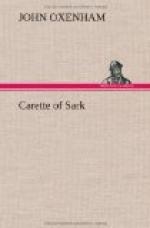Our second voyage was distinguished by a whole day’s fierce fighting with a French privateer off the Caicos Islands, while proceeding peacefully on our way from the newly acquired island of Trinidad to the St. Lawrence. It was my first experience of fighting, and a hot one at that. Between killed and wounded we lost five men, but the Frenchman left ten dead on our deck the first time he boarded, and eight the second, and after that did not try again. But he dogged us all the rest of that day and did his best to cripple us, until a fortunate shot from a carronade, which Master Nicolle ran out astern, nipped his foremast and set us free. I got a cut from a cutlass in the left arm, but it healed readily, and Captain Nicolle was pleased to compliment me on my behaviour. But, to tell the truth, I was so angry at the Frenchman’s insolent interference with us, that I thought of nothing at the time but taking it out of him with hearty thrust and blow whenever chance offered.
On our third voyage the Hirondelle went ashore in a gale off Cape Hatteras, and Captain Nicolle and half our crew were drowned. The rest of us scrambled ashore sans everything, but were well treated, and as soon as we could travel were forwarded to New York, and in time found a ship to take us to London.
So that, on the whole, I had seen a fair amount of life and death and the larger world outside, and felt my years almost doubled from what they were when I used to lie on Tintageu and watch the white-sailed ships pressing out to the great beyond.
But the things that stand out now most clearly in my memory are the homecomings and the partings and all they meant to me, but more especially the homecomings—the eager looking forward from the moment our bows pointed homewards; the joy of seeing my mother and grandfather and dear old Krok and George Hamon—Uncle George by adoption, failing that closer relationship which Providence had denied him—sympathetic listener to all our childish troubles and kindly rescuer from endless scrapes; the biting intensity of longing to meet Carette again, and to find out how things were with her and how things were between us, a longing that taught me the meaning of heartache.
For this was how matters stood between us—at least as I saw them. Each time I came home I managed, in one way or another, to get a sight, at all events, of Carette, though in some cases little more. Twice I stormed the maiden fortress in George Road, and ran the gauntlet of the Miss Maugers with less discomfiture than on the first occasion, through Miss Maddy’s sympathy and my added weight of years and experience. And once Carette was making holiday with Aunt Jeanne, and Beaumanoir saw more of me than did Belfontaine.
And my very vivid recollection of all those times is this—that Carette grew more beautiful each time I saw her, both in mind and body; that my feeling for her grew in me beyond all other growth, though the years were building me solidly; and that a fear sprang up in me at last that she was perhaps going to grow out of my reach, as she certainly was growing out of my understanding.




